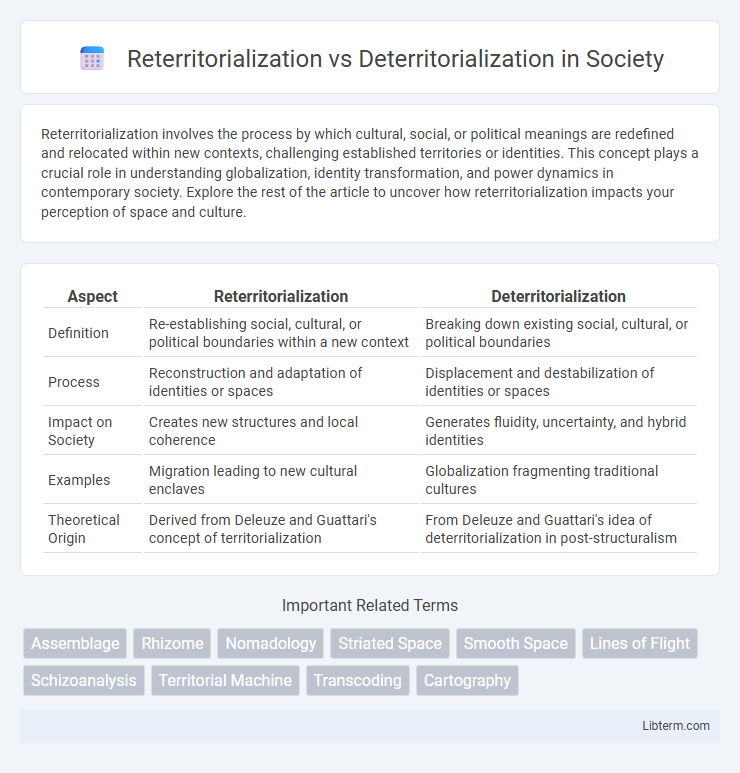Reterritorialization involves the process by which cultural, social, or political meanings are redefined and relocated within new contexts, challenging established territories or identities. This concept plays a crucial role in understanding globalization, identity transformation, and power dynamics in contemporary society. Explore the rest of the article to uncover how reterritorialization impacts your perception of space and culture.
Table of Comparison
| Aspect | Reterritorialization | Deterritorialization |
|---|---|---|
| Definition | Re-establishing social, cultural, or political boundaries within a new context | Breaking down existing social, cultural, or political boundaries |
| Process | Reconstruction and adaptation of identities or spaces | Displacement and destabilization of identities or spaces |
| Impact on Society | Creates new structures and local coherence | Generates fluidity, uncertainty, and hybrid identities |
| Examples | Migration leading to new cultural enclaves | Globalization fragmenting traditional cultures |
| Theoretical Origin | Derived from Deleuze and Guattari's concept of territorialization | From Deleuze and Guattari's idea of deterritorialization in post-structuralism |
Introduction to Reterritorialization and Deterritorialization
Reterritorialization and deterritorialization are key concepts in cultural and social theory, describing processes of restructuring space, identity, and meaning. Deterritorialization involves the breaking down of established social or cultural territories, leading to a loss of traditional boundaries and identities. Reterritorialization, conversely, refers to the reconstruction or redefinition of these territories, creating new frameworks for understanding and organizing social and cultural identities.
Defining Deterritorialization: Breaking Boundaries
Deterritorialization involves the process of breaking boundaries by displacing symbols, ideas, or cultural practices from their original contexts, leading to a reconfiguration of meaning and identity. This concept is central to postcolonial theory and globalization studies, highlighting how traditional territorial and social structures become unstable or transformed. It challenges fixed geographic, cultural, or social territories, enabling new hybrid forms and networks to emerge beyond established limits.
Understanding Reterritorialization: Reclaiming Spaces
Reterritorialization involves the process of reclaiming and redefining spaces that have been previously deterritorialized by social, political, or cultural changes. This concept is critical in understanding how communities and identities reestablish connections to place, often transforming territories through new meanings, practices, and power structures. Empirical examples include urban redevelopment projects, indigenous land reclaiming efforts, and cultural movements that assert territorial belonging amidst globalization.
Historical Contexts and Theoretical Origins
Reterritorialization and deterritorialization originate from the work of philosophers Gilles Deleuze and Felix Guattari, particularly in their book "A Thousand Plateaus" (1980), where these concepts describe processes of cultural, social, and spatial transformation. Historically, deterritorialization refers to the disconnection or displacement from established structures, such as the effects of colonialism disrupting indigenous territories, while reterritorialization involves the restructuring or reclaiming of space and identity under new conditions, evident in postcolonial nation-building. These theoretical origins have been foundational for analyzing shifts in identity, power, and globalization in various disciplines including geography, anthropology, and political theory.
Key Thinkers: Deleuze, Guattari, and Beyond
Deleuze and Guattari conceptualize deterritorialization as the process of breaking down established structures and meanings, whereas reterritorialization involves the re-establishment or transformation of these elements within new contexts. Their work in "A Thousand Plateaus" emphasizes the fluidity of social, cultural, and political territories, highlighting how power dynamics continuously displace and reconfigure identities and spaces. Beyond their theory, thinkers like Foucault and Bhabha expand on these concepts by exploring how deterritorialization and reterritorialization operate in postcolonial and biopolitical frameworks.
Deterritorialization in Globalization and Culture
Deterritorialization in globalization refers to the weakening of cultural ties and identities from specific geographic locations, enabling cultural flows to transcend traditional boundaries. This process facilitates the spread of global cultural elements, such as language, media, and consumer practices, reshaping local cultures and promoting hybrid identities. As a result, deterritorialization challenges conventional notions of cultural authenticity and sovereignty by promoting interconnectedness and cultural exchange beyond territorial constraints.
Reterritorialization in Politics and Identity Formation
Reterritorialization in politics involves the reassertion of control and boundaries over cultural, social, or political spaces previously destabilized by deterritorialization processes, often manifesting in nationalist movements or identity politics that reclaim territorial sovereignty and cultural heritage. It plays a crucial role in identity formation by reinforcing collective belonging and territorial claims, shaping political agendas that emphasize heritage, language, and traditions as foundations of political legitimacy. This dynamic impacts state formation, border politics, and transnational identity struggles, reflecting how power is negotiated and re-inscribed within contested spaces.
Real-World Examples: From Migration to Media
Reterritorialization occurs when displaced populations establish new cultural identities and social structures in host countries, exemplified by Syrian refugees adapting to life in Europe while preserving aspects of their heritage. Deterritorialization is evident in the digital revolution, where media transcends geographic boundaries, as seen in global streaming platforms delivering content that reshapes traditional cultural consumption. The interplay of migration and digital media highlights how globalization disrupts and reconstructs territorial meanings in social and cultural contexts.
Comparing Impacts: Social, Cultural, and Political Dimensions
Reterritorialization reinforces existing social structures by re-establishing cultural identities and political boundaries, often fostering a sense of belonging and stability within communities. Deterritorialization dismantles traditional cultural and political affiliations, enabling fluid identities and transnational social networks that challenge state sovereignty and cultural homogeneity. Socially, reterritorialization can limit diversity, while deterritorialization promotes hybridization; culturally, the former preserves heritage, and the latter encourages innovation; politically, reterritorialization supports nationalist agendas, whereas deterritorialization fuels global interconnectedness and resistance to centralized power.
Conclusion: Interplay and Future Perspectives
Reterritorialization and deterritorialization represent dynamic processes shaping cultural, social, and political landscapes by continuously redefining territorial boundaries and identities. Their interplay drives globalization and localization simultaneously, influencing migration patterns, economic exchanges, and identity formations. Future perspectives emphasize adaptive governance and digital technology's role in managing these complex territorial transformations for sustainable development.
Reterritorialization Infographic

 libterm.com
libterm.com